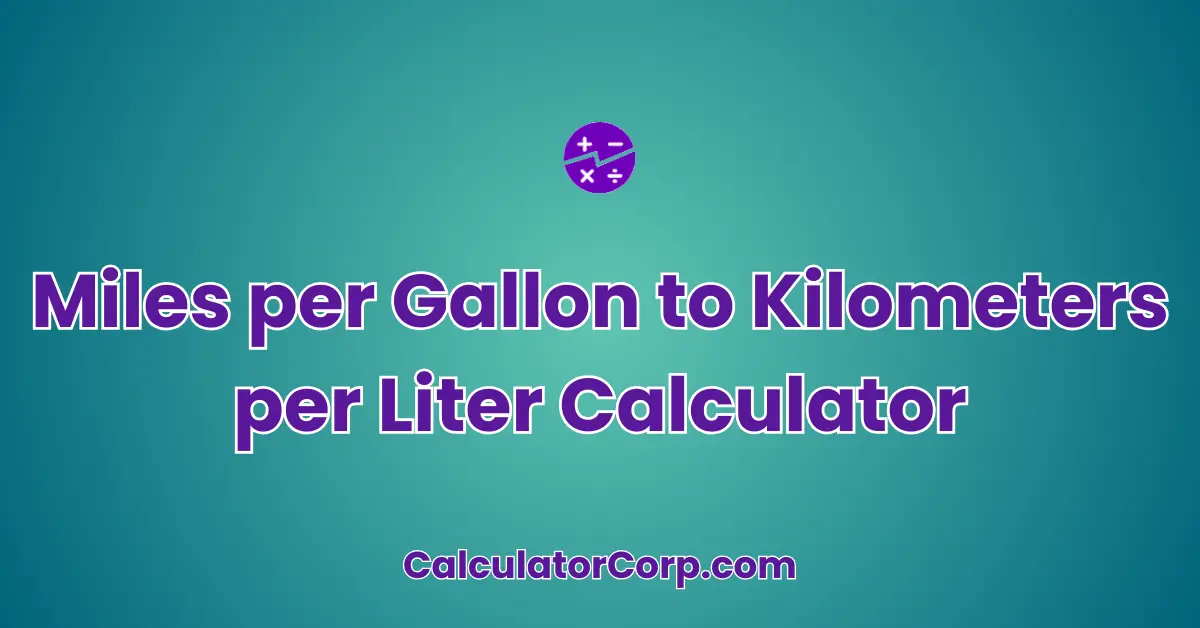Miles per Gallon (MPG) to Kilometers per Liter (km/L) Calculator
Select a value from the dropdown or enter your own value to see the conversion to kilometers per liter. (1 MPG = 0.425144 km/L)
- Field Explanation: Enter the fuel efficiency value in miles per gallon (MPG) in the input field. Ensure that the value is a positive number to get an accurate conversion.
- Result Interpretation: Once you click the “Calculate” button, the equivalent kilometers per liter (KPL) will be displayed. For example, if you enter 25 MPG, the result would be approximately 10.63 KPL.
- Tips: Double-check your input value for accuracy, and remember that rounding can slightly alter the results. For precise conversions, use the most exact MPG value available.
Backend Formula for the Miles per Gallon to Kilometers per Liter Calculator
The formula for converting miles per gallon to kilometers per liter is simple yet effective. The conversion involves:
- Miles to Kilometers: Multiply the MPG value by 1.609344 to convert miles to kilometers.
- Gallons to Liters: Divide the result by 3.785411784 to convert gallons to liters.
For example, converting 30 MPG involves multiplying by 1.609344 and then dividing by 3.785411784, resulting in approximately 12.75 KPL.
Step-by-Step Calculation Guide for the Miles per Gallon to Kilometers per Liter Calculator
Here’s how you can manually calculate the conversion:
- Convert Miles to Kilometers: Multiplying 20 MPG by 1.609344 gives 32.19 kilometers.
- Convert Gallons to Liters: Dividing 32.19 by 3.785411784 gives approximately 8.51 KPL.
- Common Mistakes to Avoid: Ensure you are using accurate conversion factors and double-check your calculations, especially rounding off values too early can lead to inaccuracies.
Real-Life Applications and Tips for Miles per Gallon to Kilometers per Liter
The calculator is beneficial in various scenarios:
- Short-Term Applications: When renting a car in a different country, comparing rental options based on fuel efficiency.
- Long-Term Applications: Planning a vehicle purchase based on fuel economy for budget predictions.
- Data Gathering Tips: Always ensure your data, such as the MPG, is from a reliable source for precise calculations.
Miles per Gallon to Kilometers per Liter Case Study Example
Consider John, a frequent traveler, who is planning to buy a car in Europe. By using the calculator, he finds out that his U.S. vehicle’s 25 MPG is approximately 10.63 KPL. This insight helps him compare European cars more effectively. John uses the calculator again after discovering a rate change to confirm his vehicle’s fuel efficiency, ensuring he makes an informed decision.
Pros and Cons of Miles per Gallon to Kilometers per Liter
Pros:
- Time Efficiency: This calculator saves significant time over manual conversions, offering quick results with minimal effort.
- Enhanced Planning: It allows you to make informed decisions when comparing international fuel efficiency standards.
Cons:
- Over-Reliance: Solely depending on the calculator without understanding the underlying factors can be risky.
- Estimation Errors: Rounding inputs or outputs can lead to less accurate results; consider cross-referencing with additional data.
Example Calculations Table
| Miles per Gallon (MPG) | Kilometers per Liter (KPL) |
|---|---|
| 20 | 8.51 |
| 25 | 10.63 |
| 30 | 12.75 |
| 35 | 14.88 |
| 40 | 17.00 |
The table above illustrates how varying MPG values correspond to KPL values. Notice how increasing MPG leads to a proportional increase in KPL, highlighting the importance of maximizing fuel efficiency.
Glossary of Terms Related to Miles per Gallon to Kilometers per Liter
- Miles per Gallon (MPG): A measure of how many miles a vehicle can travel on one gallon of fuel. Example: “A car with 30 MPG can travel 30 miles on one gallon of fuel.”
- Kilometers per Liter (KPL): A measure of how many kilometers a vehicle can travel on one liter of fuel. Related to MPG, but uses metric units.
Frequently Asked Questions (FAQs) about the Miles per Gallon to Kilometers per Liter
- What is the advantage of using a MPG to KPL converter?
Using a converter simplifies the process of understanding fuel efficiency across different measurement systems, making it easier to compare vehicle performance accurately. - How does rounding affect my results?
Rounding can introduce minor errors in the conversion. For precise calculations, use exact values and avoid rounding until the final step. - Can the calculator handle large numbers?
Yes, the calculator is designed to work with large numbers and includes formatting for readability, using thousands separators. - Is this calculator suitable for all types of vehicles?
Yes, it can be used for any vehicle, provided you have the MPG value. It’s equally effective for cars, trucks, motorcycles, and more. - Why convert to KPL?
Converting to KPL is beneficial when comparing fuel efficiency in regions using the metric system, offering a clearer understanding of a vehicle’s performance globally.
Further Reading and External Resources
- Fuel Economy – Comprehensive resource on fuel efficiency and related topics.
- CarsGuide – Tips and guides on calculating fuel consumption effectively.
- U.S. Department of Energy – Offers insights into improving vehicle fuel economy.

